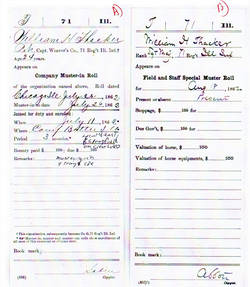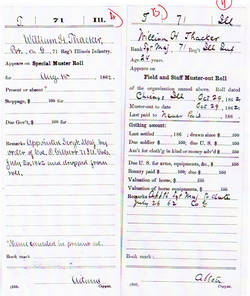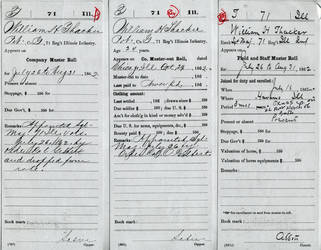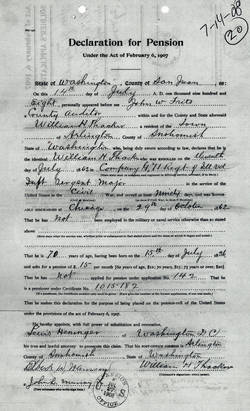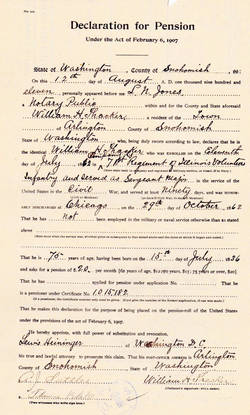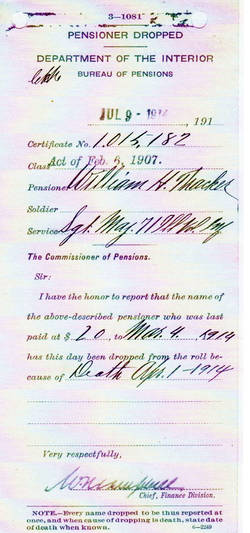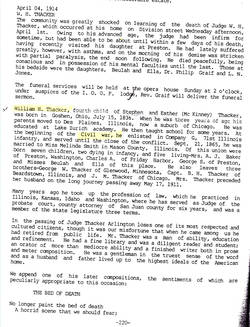William H. Thacker
Representing: Union
G.A.R Post
- E. M. Stanton Post #86 Arlington (Haller City), Snohomish Co. WA
Unit History
- 71st Illinois Infantry G
William Thacker military file 71st IL Infantry Promoted to Srgt Major July 26 1862 and dropped from roll
Full Unit History
71st ILLINOIS VOLUNTEER INFANTRY
Organized: July/August, 1862 Camp Butler Springfield, IL
Mustered In: 7/26/62 Camp Douglas Chicago, IL
Mustered Out: 10/29/62 Chicago, IL
Regimental History
REGIMENTAL HISTORY:
This three month western theater regiment was mustered into Federal service on 7/26/62. The following day it moved to Cairo, IL en-route leaving two companies at Big Muddy Bridge on the Illinois Central Railroad. The regiment remained ten days at Cairo before being ordered to Columbus, KY. At that place the men, mostly hailing from northern Illinois, suffered severely from the sudden climate change. Two more companies were detached at Mound City, IL while the remaining six were divided with three ordered to Moscow, KY and three others assigned to Little Onion Bridge to guard both the bridge and the railroad tracks. Upon completion of its term of service the unit rendezvoused at Chicago, IL where it was mustered out of existence.
Regimental losses: 0 officers killed or mortally wounded; 0 officers died of disease, accidents, etc.; 0 enlisted men killed or mortally wounded; 23 enlisted men died of disease, accidents, etc.
Soldier History
SOLDIER:
Residence: Havana, Mason Co., IL Age: 22.11 yrs.
Enlisted/Enrolled: July 11, 1862 Havana Mason Co., IL Rank: Pvt.
Mustered In: 7/26/62 Chicago, IL
Mustered Out: 10/29/62 Chicago, IL
Highest Rank: Sgt. Maj.
Family History
PERSONAL/FAMILY HISTORY:
William H. - the H is not explained in available documents - Thacker was born 7/15/36 or ‘37 in Goshen, Clement County, Illinois to Stephen (no b.d.) and Ester/Esther (nee McKinney b. 1805 NJ) Thacker. He was the fourth of seven known Thacker children. His older siblings were John (b. 1829 OH), Beulah (b. 1831 OH) and Elsie A. (b. 1834 OH) Thacker. Those younger were George W. (b. 1840 OH), Benjamin H. (b. 1841 IL) and James M. (b. 1845 IL) Thacker.
As noted by the states in which the children were born, sometime after the birth of George W. in 1840, the Thacker family quitted Ohio for Illinois. One source indicates this westward trek to the wilds of Cook County, outside of Chicago occurred when young William was three years of age. The family's place of settlement was reportedly in or near the community of Des Plaines. The nature of the family patriarch's occupation is not documented, but likely Stephen was a farmer in search of new, fertile farmland.
The U.S. Census for 1850 placed the Thackers in Main, Cook County, IL. Interestingly, Stephen is not in the household and there is no documental mention regarding his fate. Ester/Esther, now the head of the household encompassing seven children, is listed as "farmer." Also in the home was one James Synfoot (b. 1831 England). Perhaps Mr. Synfoot was Mrs. Thacker's farm hand.
Young William was not just a farm boy. He enjoyed an educated childhood in normal schools and, later, upper education at Lake Zurich Academy located in the village of Lake Zurich located north and west of Chicago. From this academic background William emerged as school teacher.
William's first place of employment may have been in Bath, Cass County, Illinois, a small village located along the east shore of the Illinois River. When he began his employment there and how long he remained in Bath is not known. However, in 1860, although he does not appear in national census tally, a documental notation notes him as being in Bond County, IL. Along with this entry is the notation - Schedule Type: Agriculture. The meaning and significance of this entry is not known.
By July 11, 1862 William was reportedly living in Havana, Mason Co., IL, a community also on the Illinois River. It was there and then -four days shy of his 24th birthday - he enlisted as a private in Captain (William H.) Weaver's Company (subsequently Co. "G") of the 71st Illinois Volunteer Infantry. The 71st was a three month unit which rendezvoused and trained at Camp Butler located east of Springfield, IL on Clear Lake. Within the 71st the well-educated William did not long remain a lowly private as on July 16th he was promoted to sergeant major - the highest rank to be obtained by an enlisted man. On that same date he transferred out of company "G" and into “Field & Staff." The promotion and transfer were made official on 7/26/62 when the 71st was mustered into Federal service.
Sergeant Major Thacker's three months of military service was apparently very non-eventful. The only notation on his service record is that he was present for duty on August, 18th. Of more interest is an event which transpired as the 71st returned by rail to Chicago for final muster and discharge. Many years later, in 1912, The Journal Of The Illinois Historical Society would publish the following: During the wanderings of this regiment in the South a bright young negro named Henry Clay came into camp and attracted favorable attention of Captain Weaver and Lieutenant (Thomas Bryon) Collins. (Ed note: On 3/3/39 Henry Clay was born a slave to a family named Titchworth. When old enough, he was employed as a house boy in the Titchworth's Moscow, KY household. With the onset of the war he ran away and became a servant for officers of the 10th Illinois Infantry. Taken prisoner along with a number of men from that regiment the Confederates made him construct breastworks. Later, he got away and came to the camp of the 71st.)The boy began serving these officers as sort of a waiter and, remaining with them to the end of their term of enlistment, boarded the train bound for Chicago.
Here William Thacker takes up the story: "I assume that very few of the people of Illinois know that, but a little while ago it was in fact a slave state. I remember well the Collins nigger as he was called and the strenuous trip from Cairo to Chicago which, owing to wrecks, bad track, etc. required three days and nights. It was generally understood that the Negro was not to go, but after we had reached some distance from Cairo he dropped out and then the fun commenced. Some of the boys, in dead earnest, took part, some for pure cussedness, and others just to see the fun go on. Time and again he was pushed, crowded or thrown from the train, and whenever the case became serious some of the men would notify the lieutenant, if he were not on hand, and by threats, commands and promises, he (Clay) would be permitted to climb back on the train. The promises were that he should be left in Chicago. Collins and I were seated together and I saw the whole thing. We ran very slowly, frequently stopping - so slowly that we would get off and run along the side of the train for rest and recreation, and these times were taken advantage of to get rid of the nigger. He was a shrewd fellow, however, and formed a manner of resistance of his own. This was to always keep on the front car, and when thrown off to swing onto the next coach as it passed, and then work his way to the front again, (and) go through the same performance as soon as we stopped or slowed up. I think that Collins intended to leave the Negro in Chicago, but as soon as discharged the men broke up into squads, and struck out for home, sometimes but one or two together, and then the darky prevailed on the lieutenant to take him home. It is strange now that for three days that Negro fought his way into the land of liberty against the threats, curses and blows of a large number of the men who were fighting for human rights under the flag of freedom."
(Ed note: concluding the Clay saga: Deciding not to leave Clay in Chicago - a stranger in a large city, far from his home - lieutenant Collins took him to his home in Cass County where Clay became a useful member of the household. However, being the only black person in Cass county - a county populated by many who did not support the war - Clay's presence proved to be a lightning rod for the focus of anti-black sentiment and even lead to legal actions against him. Friends then moved Clay to Springfield. He subsequently joined the 27th regiment of U.S. Colored Troops and served to the end of the war being wounded twice in actions around Danville and Petersburg, VA. After the war he started his own horse drawn bus service before moving to Chicago where he entered the livery business. When ill health forced him to close this business he moved to the National Soldiers Home at Danville, IL. He died there on 3/24/10 and was buried in the Home cemetery with military honors.)
*************************************************************
Exactly where William settled after leaving the army is not documented, but since his term of service had been so short he likely returned to either Bath or Havana and resumed teaching.
The next milestone in William's life was 9/21/65. That was when, in Mason County, he married to Melinda Smith (b. 9/18/46 Mason Co., IL). The new Mrs. Thacker was characterized as a college educated (Methodist Female College of Jacksonville, IL) woman, with an unassuming nature and from a Puritan family background. The union would produce seven children, five of whom are named herein, and would survive into adulthood.
William and his new bride first moved to the community of Virginia in Cass County where he continued to teach school while studying law in the office of the "honorable" J.N. Gridley. At some point thereafter, while still in Illinois, William was admitted to the bar and began practicing law.
William and Melinda's first child, daughter Mabel/Maybelle "May" was born in Illinois in February, 1867. Their second and third children, sons Charles A and George S. were born in Missouri in July, 1870 and November, 1872/'73 respectively. What prompted the move southward is not known, but years later Mrs. Thacker's obituary would address Missouri years as follows: "That country was then over run with "bush-whackers" with evil prejudices against Northern people and they (the Thackers) were advised to return north or death might be the penalty; but the frail, retiring little woman knew not fear and refused to turn back."
At some point between 1873 and 1877 the Thacker’s did return north, settling anew in the community of Virginia, Cass County, IL. There William was elected city attorney, served as justice of the peace and was part owner and editor of the Virginia Gazette newspaper.
The Thacker's fourth child, daughter Beulah, was born in Virginia on October 22nd. While birth years of 1877 and 1879 are noted, the year most often mentioned is 1878. Their fifth and final child, Ella Gertrude was also born in Illinois in January, 1888.
Not long after the birth of Ella, with the health of his wife and one of his daughters failing, William moved his family to western Kansas in hopes that the climate would be better suited for them. It proved to be worse. Then, circa 1889 he moved his clan to the state of Idaho. Exactly where they settled is not documented, but they remained there one year before removing from "the bleak region" to the community of Friday Harbor located on western Washington State's San Juan Island in San Juan County. There William's professional career would continue to flourish.
While no census data is available pertaining to William Thacker in 1890 because most of that year's tally was destroyed by fire, it appears this was the year he and his family arrived in Friday Harbor. It is likely he immediately opened a law practice and became known in the small, somewhat isolated island community as; in 1892 he was elected to a two year term as San Juan County attorney. Re-election to the office followed in 1894.
In 1896. William's political stature continued to grow as he was elected to the Washington State House of Representatives for the 47th District as a Republican. He was sent back to Olympia for a second two year term in 1898. From 1900 to 1902 he again filled the office of San Juan County Attorney before returning to the state house again for the 1902/'03 legislative term which would be his final in elective office. Along the way he also served several years as a probate judge in San Juan County.
The 1900 U.S. Census for Friday Harbor, San Juan County noted that in addition to William and Melinda, also in the household were all five of the Thacker surviving "children": Mabel 33; Charles 30; George 27; Beulah 22 and Ella 14. Also under the Thacker room was 24 year old Mary A. Thacker, the wife of one of the Thacker sons.
1900 was also significant as in early July of that year William began the process of applying for an invalid pension based on his brief period of Civil War soldiering. Initial basis for his request was inability to earn a living by manual labor due to general disability from age and senile debility. A September 4th medical exam noted that he had been increasingly losing strength in recent years and was only able to do a half day's labor. He also evidenced some deafness in his right year. Vital statistics for the now 64 year old were listed as 5'7" in height and weighing 135 pounds. A $6 per month stipend was forthcoming.
In 1903 William and Melinda quitted the capricious island weather and chilly fogs of Friday Harbor for the more friendly climes of the western Washington mainland. Their new home was the north Snohomish county community of Arlington. Apparently making the move with them were daughters Beulah and Ella. There William retired from all active business life.
The next seven years of William's life were seemingly quiet. The only occurrences of significance were primarily focused on increases in his pension payments. In 1907 the monthly stipend increased to $10. In 1908 it moved upward to $15. At his passing it would be $20 per month.
At the time of the 1910 U.S. census the Thacker's Arlington household consisted of William, Melinda and daughters Beulah and Ella. It would be the final population tally for both of the elder Thacker’s.
On 5/17 (or 18) of 1911 Melinda, always delicate of health, died. Documental cause of death is not available. She was four months shy of her 65th birthday. Her Arlington newspaper obituary related in part: "Mrs. Thacker had a large circle of friends who learned to look up to her as a model Christian woman, wife, mother and friend. Owing to advanced age and failing health she had lived a very retired life since coming to Arlington, but her past life had been active in feeding the hungry, clothing the naked and administering to the distressed. She was fond of company which she chose not on the basis of wealth and prominence, but rather from considerations of true culture and gentility." Burial was in Arlington's Harwood Cemetery.
With his wife gone, William continued on with his life "spending his remaining days in quiet enjoyment of his home and literary pursuits midst family, friends and (his) well-assorted library." Although his mental faculties remained intact, His physical health declined to where, at some point he was stricken partial paralysis. The Honorable William Thacker, one time Civil War soldier, was released from this physical impairment only by death. He died in his Arlington Heights home on April 1st, 1914. His newspaper obituary read in part: "Judge Thacker was a man of ability, education and refinement. He had a fine library and was a diligent reader and student; an orator of more than mediocre ability and a finished writer in both prose and metered composition. He was a gentleman in the truest sense of the word as a husband and father lived up to the highest ideals of the American home."
The last poem he penned "The Bed of Death" was heralded as well illustrating his faith in life immortal:
No longer paint the bed of death,
A horrid scene that we should fear
But rather draw a spirit land
Of friends and loved ones gathering near
To bear the unchained soul away
To broader realms and higher spheres
To make its onward, upward way
Forever, through the endless years.
What we call death is but a change
From the earthly care and pain and strife,
In a world of fairer fields
Of purer thought and truer life
We should not shed the tear.
And mourn as for one that's lost,
When one we love is free from pain
And the "Dark River" safely crossed.
Then paint no more the bed of death,
A scene of terror one should dread;
All who have left this vale of tears,
Are living still - They are not dead!
Burial was in the Arlington Harwood Cemetery beside Melinda.
Cemetery
Buried at Arlington Municipal Cemetery

